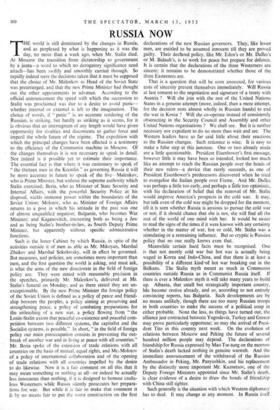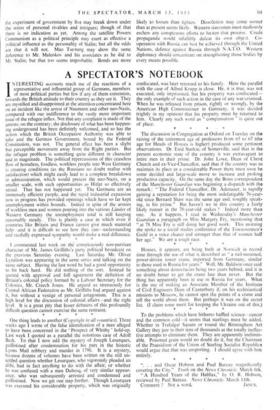RUSSIA NOW
THE world is still dominated by the changes in Russia, and as perplexed by what is happening as it was the day, no more than a week ago, when Mr. Stalin died. At Moscow the transition from dictatorship to government by a junta—a word to which no derogatory significance need attach—has been swiftly and smoothly carried through. So rapidly indeed were the decisions taken that it must be supposed that the choice of Mr. Malenkov as Head of the Soviet State was prearranged, and that the new Prime Minister had thought out the other appointments in advance. According to the official announcement the speed with which the succession to Stalin was proclaimed was due to a desire to avoid panic— whether internal or external is left to the imagination. The choice of words, if " panic " is an accurate rendering of the Russian, is striking, but hardly as striking as it seems, for it is obvious that an interregnum of any length would have given opportunity for rivalries and discontents to gather force and imperil the whole future of the regime. The expedition with which the principal changes have been effected is a testimony to the efficiency of the Communist machine in Moscow. Of the changes themselves it is not necessary to speak in detail. Nor indeed is it possible yet to estimate their importance. The essential fact is that where it was customary to speak of "the thirteen men in the Kremlin" as governing Russia it will be more accurate in future to speak of the five—Malenkov, who is Prime Minister, but without the supreme authority which Stalin exercised; Beria, who as Minister of State Security and Internal Affairs, with the powerful Security Police at his disposal, wields immense power within the boundaries of the Soviet Union; Molotov, who as Minister of Foreign Affairs returns to a post in which his attitude in the past was one of almost unqualified negation; Bulganin, who becomes War Minister; and Kaganovitch, interesting both as being a Jew and as being Stalin's brother-in-law, as fourth Deputy Prime Minister, but apparently without specific administrative functions. - i Such is the Inner Cabinet by which Russia, n spite of the activities outside it of men as able as Mr. Mikoyan, Marshal Zhukov and Marshal Sokolovsky, will in effect be governed. But measures, and policies, are sometimes more important than men, and the first question the world is asking, and must ask, is what the aims of the new directorate in the field of foreign policy are. They were stated with reasonable precision in the speeches, primarily Mr. Malenkov's, delivered at Mr. Stalin's funeral on Monday; and as there stated they are un- exceptionable. By the new Prime Minister the foreign policy of the Soviet Union is defined as a-policy of peace and friend- ship between the peoples, a policy aiming at preserving and strengthening peace, a policy of combating preparations for the unleashing of a new war, a policy flowing from "the Lenin-Stalin axiom that peaceful co-existence and peaceful com- petition between two different systems, the capitalist and the Socialist systems, is possible." In short, "in the field of foreign policy our main preoccupation consists in preventing the out- break of another war and in living at peace with all countries." Mr. Beria spoke of the extension of trade relations with all countries on the basis of mutual, equal rights, and Mr.-Molotov of a policy of international collaboration and of the opening of trade relations with all countries impelled by the desire to do likewise. Now it is a fair comment on all this that it may mean -something or nothing at all—or indeed be actually less innocuous than nothing, if it is designed to bemuse credu- lous Westerners while Russia silently prosecutes her prepara- tions for, war. But while it is fair to make that comment it is by no means fair to put the worst construction on the first declarations of the new•Russian governors. They, like lesser men, are entitled to be assumed innocent till they are proved guilty. Their declared policy, like Mr. Eden's or Mr. Dulles's or M. Bidault's, is to- work for peace but prepare for defence. It is certain that the declarations of the three Westerners are sincere; it remains to be demonstrated whether those of the three Easterners are.
That is a question' that will be soon answered, for various tests of sincerity present themselves immediately. Will Russia at last consent to the negotiation and signature of a treaty with Austria ? Will she join with the rest of the United Nations States in a genuine attempt (more, indeed, than a mere attempt, for the decision rests almost wholly in Russian hands) to end the war in Korea ? Will she co-operate instead of consistently obstructing in the Security Council and Assembly and other United Nations organisations ? We shall see. But it is neither necessary nor expedient to do no more than wait and see. The Western leaders have so far said little about their reactions to the Russian changes. Such reticence is wise. It is easy to' make a false step at this juncture. One or two already made are a little questionable. President Eisenhower's first message, however little it may have been so intended, looked too much like an attempt to reach the Russian people over the heads of their new rulers—a device that rarely succeeds, as one of President Eisenhower's predecessors discovered when he tried to evangelise the Italian people over Fiume. And Mr. Dulles was perhaps a little too early, and perhaps a little too optimistic, with his declaration of belief that the removal of Mr. Stalin would improve America's prospects in the cold war. It may, but talk even of the cold war might be dropped for the moment, till it is seen whether Russia is anxious to pursue the cold war or not; if it should chance that she is not, she will find all the rest of the world of one mind with her. It -would be easier to read the signs of the times if it were known with any certainty whether in the matter of war, hot or cold, Mr. Stalin was a stimulating or a restraining influence. But so cryptic is Russian policy that no one really knows even that.
Meanwhile certain hard facts must be recognised. One is that not merely cold war but hot war is actually being waged in Korea and Indo-China, and that there is at least a possibility of a different kind-of hot war breaking out in the Balkans. The Stalin myth meant as much in Communist countries outside Russia as in Communist Russia itself. If there is ever a Malenkov myth it will take many years to build up. Albania, that small but strategically important country, Ids become restive already, and so, according to not entirely convincing reports, has Bulgaria. Such developments are by no means unlikely, though there are too many Russian troops in both countries to make the success of a political coup in either probable. None the less, as things have turned out, the alliance just contracted between Yugoslavia, Turkey and Greece may prove particularly opportune; so may the arrival of Presi- dent Tito in this country next week. On the evolution of relations between Moscow and Peking the future of several hundred million people may depend. The declarations of friendship for Russia expressed by Mao Tse-tung on the morrow of Stalin's death lacked nothing in genuine warmth. And the immediate announcement of the withdrawal of the Russian Ambassador in Peking, Mr. Panyushkin, and his replacement by the distinctly more important Mr. Kuznetsov, one of the Deputy Foreign Ministers appointed since Mr. Stalin's death, is clear evidence of a desire to draw the bonds of friendship with China still tighter.
Such generally is the situation with which Western diplomacy has to deal. It may change at any moment. In Russia itself the experiment of government by five may break down under the stress of personal rivalries and intrigues; though of that there is no indication as yet. Among the satellite Powers Communism as a political principle may exert as effective a political influence as the personality of Stalin; but all the odds are that it will not. Mao Tse-tung may show the same deference to Mr. Malenkov and his associates as he did to Mr. Stalin; but that too seems improbable. Bonds are more likely to loosen than tighten: Dissolution may come sooner than at present seems likely. Western statesmen must studiously eschew any conspicuous efforts to hasten that process. Crude propaganda would infallibly defeat its own obje2t. Co- operation with Russia can best be achieved through the United Nations, defence against Russia through N.A.T.O. Western diplomacy should concentrate on strengthening those bodies by every means possible.



































 Previous page
Previous page